It gives us great pleasure to share with you what some of the amazing young feminist groups that we proudly support have been doing since they became a part of the FRIDA community. Each of these groups are fighting resilient feminist struggles in their own unique ways and we are constantly inspired by their work. We are sure you will be too if you read more about the incredible things they have managed to achieve in a span of a single year (or even lesser). Read on!
Cliquez ici pour lire en français
Haga clic aquí para leer esto en español
Sub- Saharan Africa
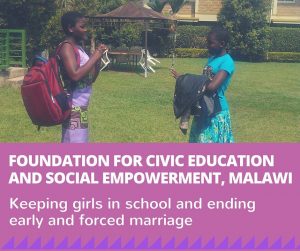 FOCESE, Malawi has established girls clubs in five schools, to create a safe space for girls to discuss issues which affect them and their ability to attend and perform well in school. In addition to this, they used the grant to assist 25 teen mothers to go go back to school. Lastly, they have done extensive lobbying of community leaders against forced marriage given that they are considered the “custodians of culture”; support from these leaders has helped the group to challenge cultural norms and beliefs on girls rights and forced marriage. Furthermore, this lead to a bylaw which enforces a fine on parents who force their children into marriages.
FOCESE, Malawi has established girls clubs in five schools, to create a safe space for girls to discuss issues which affect them and their ability to attend and perform well in school. In addition to this, they used the grant to assist 25 teen mothers to go go back to school. Lastly, they have done extensive lobbying of community leaders against forced marriage given that they are considered the “custodians of culture”; support from these leaders has helped the group to challenge cultural norms and beliefs on girls rights and forced marriage. Furthermore, this lead to a bylaw which enforces a fine on parents who force their children into marriages.
 Girls Redefined, Kenya has held 11 anti – Female Genital Mutilation (FGM) community sensitization meetings with local leaders as well as a former “cutter”, this has given their work legitimacy with members of the community and strengthened their awareness campaigns on the health risks of FGM. Furthermore, they trained 42 girls to be anti-FGM ambassadors who will conduct peer outreaches in their communities.
Girls Redefined, Kenya has held 11 anti – Female Genital Mutilation (FGM) community sensitization meetings with local leaders as well as a former “cutter”, this has given their work legitimacy with members of the community and strengthened their awareness campaigns on the health risks of FGM. Furthermore, they trained 42 girls to be anti-FGM ambassadors who will conduct peer outreaches in their communities.
Maono Safi, Tanzania held leadership workshops with 35 young women some of who now hold leadership positions in the refugee camp. As a result, both men and women’s beliefs and views are being changed towards as women’s ability to lead is made evident.
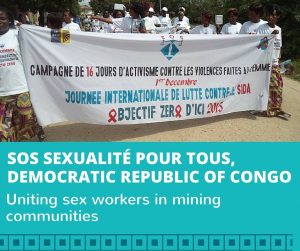 SOS Sexualité Pour Tous, Congo has held 48 advocacy meetings to address the stigmatization and discrimination of sex workers, and raising awareness on sex workers’ rights. They also promoted the correct and consistent use of condoms by sex workers; as well as addressed the inaccessibility to condoms in mining areas by purchasing and distributing over 7000 condoms. Their work has led to a 35% increase in membership; including newly trained peer educators who share SRHR information with sex workers.
SOS Sexualité Pour Tous, Congo has held 48 advocacy meetings to address the stigmatization and discrimination of sex workers, and raising awareness on sex workers’ rights. They also promoted the correct and consistent use of condoms by sex workers; as well as addressed the inaccessibility to condoms in mining areas by purchasing and distributing over 7000 condoms. Their work has led to a 35% increase in membership; including newly trained peer educators who share SRHR information with sex workers.
Middle East & North Africa
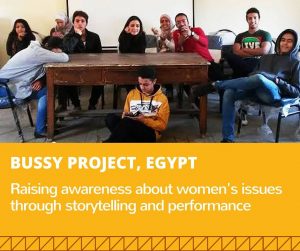 The Bussy Project, Egypt is using their storytelling approach, they created a performance to share and explore gender issues; which generated a lot of press and eventually led to it being censored. The group also created a website; which allows for the sharing of experiences, ideas and views anonymously. Both of these strategies have allowed for the discussion of gender –related issues often considered taboo and challenged stigmas around gender norms.
The Bussy Project, Egypt is using their storytelling approach, they created a performance to share and explore gender issues; which generated a lot of press and eventually led to it being censored. The group also created a website; which allows for the sharing of experiences, ideas and views anonymously. Both of these strategies have allowed for the discussion of gender –related issues often considered taboo and challenged stigmas around gender norms.
Fe-male, Lebanon held a training for members to build their capacities on gender, feminism and the women’s rights situation in Lebanon. They also organized workshops and panel discussions to raise awareness on issues related to women’s rights; especially women’s image in media and ads as well as sexual violence. The group also developed a new website in order to attract more views of and engagement with their content. The group also used graffiti in a strategic area of Beirut to protest the objectification of women in media and ads. Here is a short video on their Graffiti project #NotAnObject
Asurif, Algeria used their grant to secure a space for the group to work in, planning activities such as a conferences/talks on ‘Violence against Women’ and ‘Women’s role in the contemporary era’ in order to initiate debates with university-level young women; raising their awareness on key issues and encouraging them to be active agents in their society. Furthermore, they set up and maintain the group’s website.
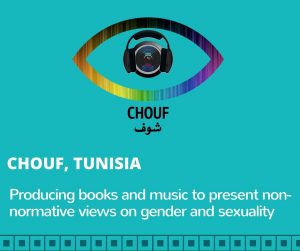 Chouf, Tunisia Using the grant from FRIDA; Chouf was able to begin developing its’ website to raise awareness on the issue of LBT in the MENA region. As a celebration of IDAHOT, Chouf hosted “Chouftouhonna Festival: ‘the festival of feminist art.’: creating a space for LBT women to express and discuss the issues and challenges they face in the region. The group has introduced art as a method of activism as well as encouraged cross-country partnerships and collective action within the region to advocate for the decriminalisation of homosexuality as well challenging homophobia. Chouf has also conducted three workshops on the following: Digital Security, Juridical training and Fundraising skills as well as rented a space to conduct self-defense classes for its’ members.
Chouf, Tunisia Using the grant from FRIDA; Chouf was able to begin developing its’ website to raise awareness on the issue of LBT in the MENA region. As a celebration of IDAHOT, Chouf hosted “Chouftouhonna Festival: ‘the festival of feminist art.’: creating a space for LBT women to express and discuss the issues and challenges they face in the region. The group has introduced art as a method of activism as well as encouraged cross-country partnerships and collective action within the region to advocate for the decriminalisation of homosexuality as well challenging homophobia. Chouf has also conducted three workshops on the following: Digital Security, Juridical training and Fundraising skills as well as rented a space to conduct self-defense classes for its’ members.
CEECCNA
Trans Mreza Balkan, Croatia The group went through a period of internal strengthening; conducting a survey to get better insights of the needs of the trans community in the region to then plan their activities and strategic plan for the coming years; they now have a refined mission, vision and values and a three year strategic plan. In addition to this, the group held a conference for 40 health care and legal professionals as well as members of the LGBT community from their region on trans-related topics, and have launched an information portal/website as a space for authentic expression by trans persons from the region and raising awareness about the diversity of identities and experiences.
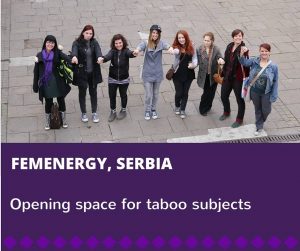 Femenergy, Serbia adapted a public space to use for their activities, making the space more accessible (safe & open) to youth. One of the activities they held was to train 150 young people on how to recognize sexual violence and what to do to protect themselves. The group also created a website where they share blog posts on key themes as well as photo stories of their work. The main focus of the group was also on strengthening the groups capacity; participating in trainings to develop their writing and workshop skills ; these will enable the group to lead and facilitate key discussions as well as share their work widely.
Femenergy, Serbia adapted a public space to use for their activities, making the space more accessible (safe & open) to youth. One of the activities they held was to train 150 young people on how to recognize sexual violence and what to do to protect themselves. The group also created a website where they share blog posts on key themes as well as photo stories of their work. The main focus of the group was also on strengthening the groups capacity; participating in trainings to develop their writing and workshop skills ; these will enable the group to lead and facilitate key discussions as well as share their work widely.
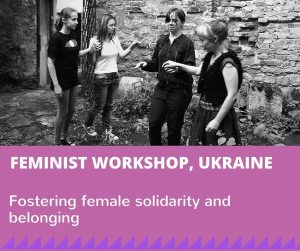 Feminist Workshop, Ukraine have held over 19 events, mainly workshops and trainings focusing on a wide range of issues and activities to increase awareness, knowledge and skills of women as an empowerment strategy. For instance, the group has held; a finance management training for women, a talk on Nationalism in Ukraine (for women only), organisaed reading groups on prostitution, held English language classes for activists, an exhibition on “motherhood” from a feminist perspective and have even started a feminist library.
Feminist Workshop, Ukraine have held over 19 events, mainly workshops and trainings focusing on a wide range of issues and activities to increase awareness, knowledge and skills of women as an empowerment strategy. For instance, the group has held; a finance management training for women, a talk on Nationalism in Ukraine (for women only), organisaed reading groups on prostitution, held English language classes for activists, an exhibition on “motherhood” from a feminist perspective and have even started a feminist library.
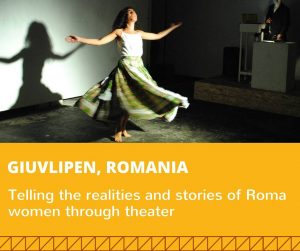 Giuvlipen, Romania Conducted performances with Roma actresses on topics such as: forced marriage, hypersexualization and eroticization of Roma women, heteronormativity in Roma communities, anti-Roma violence, forced evictions of Roma people in Bucharest as well as conducted workshops on hate speech and gendered violence. These performances were held in small Roma communities and were followed by debates that involved the whole community on important feminist topics. The groups approach gained them recognition and led to them being invited to perform at various theatre festivals. Here are photos and a video of the group performing ‘Sara Kali The Dark Madonna’ in Bucharest The group has also begun the process of formerly registering their group.
Giuvlipen, Romania Conducted performances with Roma actresses on topics such as: forced marriage, hypersexualization and eroticization of Roma women, heteronormativity in Roma communities, anti-Roma violence, forced evictions of Roma people in Bucharest as well as conducted workshops on hate speech and gendered violence. These performances were held in small Roma communities and were followed by debates that involved the whole community on important feminist topics. The groups approach gained them recognition and led to them being invited to perform at various theatre festivals. Here are photos and a video of the group performing ‘Sara Kali The Dark Madonna’ in Bucharest The group has also begun the process of formerly registering their group.
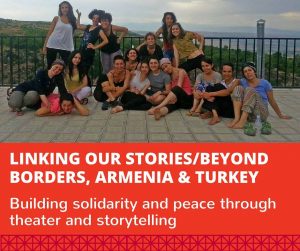 Beyond Borders, Armenia/Turkey the group participated in the Feminist Caravan conferences in Romania and Bulgaria; using workshops and body-movement performance pieces to build trust, solidarity and as a peace-building strategy. Their success in doing so was also largely due to the group creating a safe spaces where difficult conversations could be had, emotions could be felt and the body could be prioritized. Furthermore, they exposed the audience (which included activists & academics) to an alternative and innovative method of building trust and peace among peoples. Here is a video of the Beyond Borders performance at Adlente Social Center in Sofia, Bulgaria.
Beyond Borders, Armenia/Turkey the group participated in the Feminist Caravan conferences in Romania and Bulgaria; using workshops and body-movement performance pieces to build trust, solidarity and as a peace-building strategy. Their success in doing so was also largely due to the group creating a safe spaces where difficult conversations could be had, emotions could be felt and the body could be prioritized. Furthermore, they exposed the audience (which included activists & academics) to an alternative and innovative method of building trust and peace among peoples. Here is a video of the Beyond Borders performance at Adlente Social Center in Sofia, Bulgaria.
Asia & the Pacific
Emerging Leaders Forum Alumni, Fiji organized a photography exhibition called Through ELFA Lenses to raise awareness on key themes such as: mental health, climate change, SRHR, media freedom, feminism and movement building. ELFA as a Co-Convener of the Fiji Young Women’s Forum along with other young women participated in the development of outcome statements, declarations and a toolkit “My Guide to Voting” for the lobbying for increased political participation and recognition of young women in the political arena. Many of the young women present were very motivated to not only be involved in the democratization processes, some of them were inspired to run for the next elections; with one of the participants later standing for national elections. Listen to an interview about ELFA and the Through ELFA lenses exhibition here.
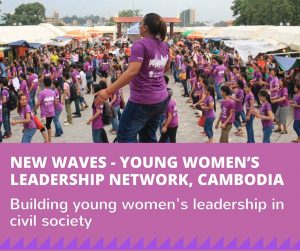 New Waves – Young Womens Leadership Network, Cambodia a key component of their work is in granting other young women led initiatives with part of the grant they receive from FRIDA, read more about the groups they awarded grants to here. They have also done 5 radio shows reaching 12 provinces in Cambodia; discussing issues such as: ‘Women in Politics’, ‘Men’s Participation in Promoting Women’s Rights’ as well as ‘Land and Housing Rights for Women’. Finally, the group co-organized an event with approximately 2000 participants to promote women’s rights during the 16 days of activism on VAW, as well as held workshops to strengthen young women’s leadership and understanding of feminism.
New Waves – Young Womens Leadership Network, Cambodia a key component of their work is in granting other young women led initiatives with part of the grant they receive from FRIDA, read more about the groups they awarded grants to here. They have also done 5 radio shows reaching 12 provinces in Cambodia; discussing issues such as: ‘Women in Politics’, ‘Men’s Participation in Promoting Women’s Rights’ as well as ‘Land and Housing Rights for Women’. Finally, the group co-organized an event with approximately 2000 participants to promote women’s rights during the 16 days of activism on VAW, as well as held workshops to strengthen young women’s leadership and understanding of feminism.
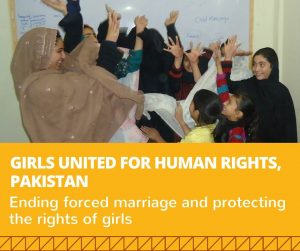 Girls United for Human Rights, Pakistan girls lead group conducted a range of community sensitization campaigns including meeting with legislators and religious leaders to advocate against forced marriage and gain their support in changing perceptions on forced marriage. Furthermore the group organized training for civil society organizations (CSOs) to ensure that CSOs understand the law and lacunas in it and build pressure for pro-girls legislation. The group also published 3 articles in newspapers to reach a wider audience on the negative impacts of forced marriages and strategies to prevent them at grass root level. Lastly, they were able to stop 2 girls from forced marriages by providing the families with the financial support they needed to support the girls and to return to school. For more on the impact of GUHR and other FRIDA grantees on forced marriage; please read our Special Impact Report on Forced Marriage.
Girls United for Human Rights, Pakistan girls lead group conducted a range of community sensitization campaigns including meeting with legislators and religious leaders to advocate against forced marriage and gain their support in changing perceptions on forced marriage. Furthermore the group organized training for civil society organizations (CSOs) to ensure that CSOs understand the law and lacunas in it and build pressure for pro-girls legislation. The group also published 3 articles in newspapers to reach a wider audience on the negative impacts of forced marriages and strategies to prevent them at grass root level. Lastly, they were able to stop 2 girls from forced marriages by providing the families with the financial support they needed to support the girls and to return to school. For more on the impact of GUHR and other FRIDA grantees on forced marriage; please read our Special Impact Report on Forced Marriage.
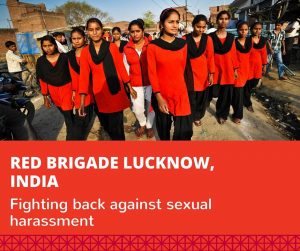 Red Brigade Lucknow, India: The group conducted an awareness campaign on sexual violence against women, which lead to the installation of CCTV cameras in different areas of their city to avert and capture sexual violence/harassment, in addition to this; they held a self-defense workshop for girls. The group also ran a campaign against acid attacks, pressuring the state government to implement court directives on the restriction of the sale of acid and compensation to victims of acid attacks; which resulted in the compensation of 60 acid attack survivors and Red Brigade also led a crowd-funding campaign to raise funds for the treatment of acid attack survivors.
Red Brigade Lucknow, India: The group conducted an awareness campaign on sexual violence against women, which lead to the installation of CCTV cameras in different areas of their city to avert and capture sexual violence/harassment, in addition to this; they held a self-defense workshop for girls. The group also ran a campaign against acid attacks, pressuring the state government to implement court directives on the restriction of the sale of acid and compensation to victims of acid attacks; which resulted in the compensation of 60 acid attack survivors and Red Brigade also led a crowd-funding campaign to raise funds for the treatment of acid attack survivors.
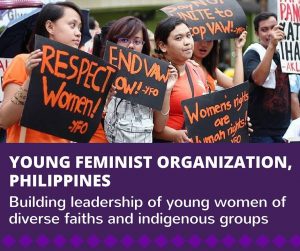 Young Feminist Organization, Philippines has held workshops for over 95 young women on topics such as Violence Against Women and Children, HIV-AIDS, Climate change and Disaster Risk Preparedness. YFO participated in public demonstrations to call for the end of violations of human rights and climate justice. Through such activities, the group has also strengthened its’ relationship with other NGOs and youth led groups, which further strengthened their ability to reach more people with key messages on feminism.
Young Feminist Organization, Philippines has held workshops for over 95 young women on topics such as Violence Against Women and Children, HIV-AIDS, Climate change and Disaster Risk Preparedness. YFO participated in public demonstrations to call for the end of violations of human rights and climate justice. Through such activities, the group has also strengthened its’ relationship with other NGOs and youth led groups, which further strengthened their ability to reach more people with key messages on feminism.
Madalenas, Timor Leste focused on organisational development through running workshops for its members; in order to enhance the group’s’ capacity. The workshops were: Monitoring & Evaluation and a Vision and Mission workshop; which not only allowed the group to develop an artivism strategy to raise the dignity of women. They therefore also received training in different styles of facilitation using collaborative, participatory methods, as well as classes to strengthen members performance and art skills in order to develop performances and other creative ways to raise awareness on women’s empowerment and violence against women.
Latin America & the Caribbean
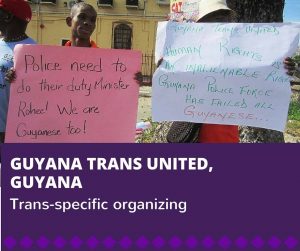 Guayana Trans United (GTU) In response to the murder of two trans youth, the group conducted a peaceful protest to attract media and Guyanese public attention, in order to pressurize the relevant authorities to act on these murders but also to stand in solidarity with the victims’ families. GTU also advocated for justice for a human rights activist who had been harassed by a Government minister, their actions contributed to the minister’s dismissal from office. GTU has also supported their members to take part in key capacity building activities; such as a workshop on Security and training on Sexuality and Relationship counseling.
Guayana Trans United (GTU) In response to the murder of two trans youth, the group conducted a peaceful protest to attract media and Guyanese public attention, in order to pressurize the relevant authorities to act on these murders but also to stand in solidarity with the victims’ families. GTU also advocated for justice for a human rights activist who had been harassed by a Government minister, their actions contributed to the minister’s dismissal from office. GTU has also supported their members to take part in key capacity building activities; such as a workshop on Security and training on Sexuality and Relationship counseling.
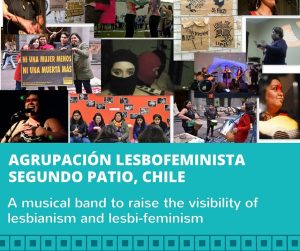 Agrupacion Lesbofeminista Segundo Patio, Chile the group has shared information regarding the rights of women, feminism as well as promoted women’s art. They have organised workshops on the prevention of violence against women and girls, workshops for women such dance workshops as a form of therapy for girls and women as well as held discussions on abortion. Furthermore, the group organized an inter-generational dialogue to explore the country’s history and current status on women’s human rights. Finally, the group is compiling a book: “Stories of Women from Wallmapu”, which is a collection of stories of women and their different experiences from the southern part of Chile as an “invitation for women to free themselves from shame and to confront their fears”.
Agrupacion Lesbofeminista Segundo Patio, Chile the group has shared information regarding the rights of women, feminism as well as promoted women’s art. They have organised workshops on the prevention of violence against women and girls, workshops for women such dance workshops as a form of therapy for girls and women as well as held discussions on abortion. Furthermore, the group organized an inter-generational dialogue to explore the country’s history and current status on women’s human rights. Finally, the group is compiling a book: “Stories of Women from Wallmapu”, which is a collection of stories of women and their different experiences from the southern part of Chile as an “invitation for women to free themselves from shame and to confront their fears”.
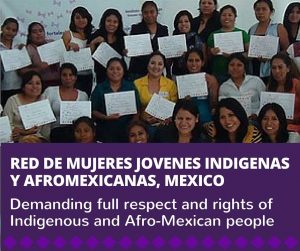 Red De Mujeres Jovenes Indigenas Y Afromexicanas (REMJINA), Mexico Conducted workshops with authorities regarding protocols for attending to sexual violence; feedback from young women has indicated improved support and service provision in cases of sexual harassment and/or violence. The group also conducted a protest to reclaim women’s bodies wearing body paint as a peaceful yet artistic approach to sharing their messages. Furthermore, the group organized a conference on ‘new masculinities’ as well as workshops on self-care and creative communication. The group also held a radio show and shared materials adapted to indigenous and afro-contexts in order to promote the rights and increase awareness on young indigenous and afro-Mexican women.
Red De Mujeres Jovenes Indigenas Y Afromexicanas (REMJINA), Mexico Conducted workshops with authorities regarding protocols for attending to sexual violence; feedback from young women has indicated improved support and service provision in cases of sexual harassment and/or violence. The group also conducted a protest to reclaim women’s bodies wearing body paint as a peaceful yet artistic approach to sharing their messages. Furthermore, the group organized a conference on ‘new masculinities’ as well as workshops on self-care and creative communication. The group also held a radio show and shared materials adapted to indigenous and afro-contexts in order to promote the rights and increase awareness on young indigenous and afro-Mexican women.
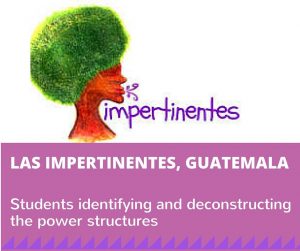 Las Impertinentes, Guatemala through the creation of Casa Impertinente a space that is safe for artistic exchange, education and reflection; the group has created a platform in which feminism can be explored by young women, lesbians as well as indigenous young women, including the study and debate of Latin American feminist theories. The group has also held performances at festivals and poetry nights, organized feminist self-defense classes as well as a Feminist drum circle in order to empower women, and build a community that is safe and free of violence.
Las Impertinentes, Guatemala through the creation of Casa Impertinente a space that is safe for artistic exchange, education and reflection; the group has created a platform in which feminism can be explored by young women, lesbians as well as indigenous young women, including the study and debate of Latin American feminist theories. The group has also held performances at festivals and poetry nights, organized feminist self-defense classes as well as a Feminist drum circle in order to empower women, and build a community that is safe and free of violence.
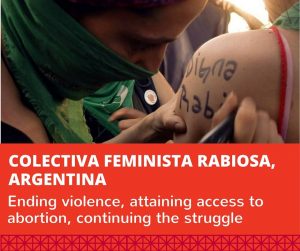 Colectiva Feminista Rabiosa, Argentina Supported a young woman wrongfully accused of femicide by attending the court proceedings and therefore increasing the visibility of the case in the media and therefore exerting social pressure along with other organizations which contributed to the young woman being freed. They have also set up information tables in public plazas to provide information about safe, legal and free abortion; as access to accurate information on abortion is difficult. They have also continued to publicly share anti-homophobia messages on various media platforms. Lastly, the group held trainings for their members on topics such as feminist theory, feminist economy, drug and people trafficking, feminism and religion, trans-gender and lesbofeminism in order to strengthen the group’s capacity in awareness-raising and the development of effective and inclusive campaigns.
Colectiva Feminista Rabiosa, Argentina Supported a young woman wrongfully accused of femicide by attending the court proceedings and therefore increasing the visibility of the case in the media and therefore exerting social pressure along with other organizations which contributed to the young woman being freed. They have also set up information tables in public plazas to provide information about safe, legal and free abortion; as access to accurate information on abortion is difficult. They have also continued to publicly share anti-homophobia messages on various media platforms. Lastly, the group held trainings for their members on topics such as feminist theory, feminist economy, drug and people trafficking, feminism and religion, trans-gender and lesbofeminism in order to strengthen the group’s capacity in awareness-raising and the development of effective and inclusive campaigns.
Colectiva Agitadoras Sociales, Bolivia has been doing important work to fight harassment and gender based violence through the generation of collective dialogue between women, building bonds of solidarity and training courses in Feminist Self-defense for women with all the focus on “no victimization” strength, but from the autonomy of women to the protection of our own lives.